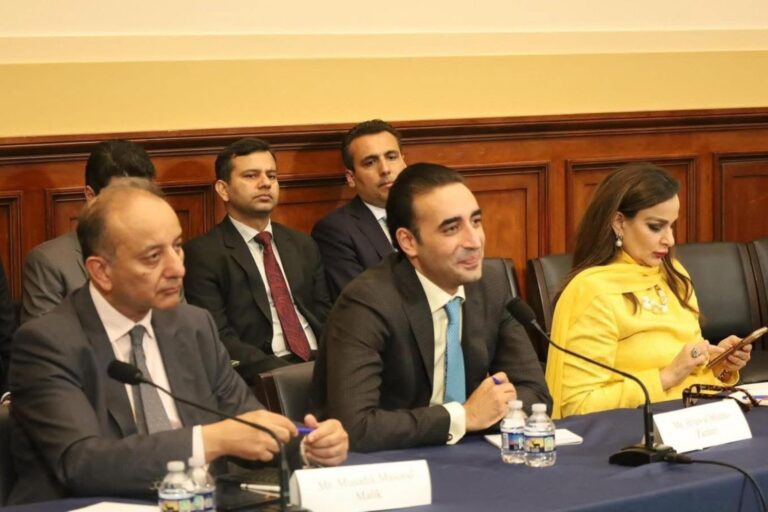In a series of high-level meetings with members of the US House Foreign Affairs Committee, Pakistan Peoples Party (PPP) Chairman and former foreign minister Bilawal Bhutto Zardari cautioned against India’s increasingly aggressive posture, warning it could destabilise the entire South Asian region.
Leading a multi-party Pakistani delegation to Washington, Bilawal urged American lawmakers to back Pakistan’s “mission of peace” and facilitate meaningful dialogue to prevent the escalation of hostilities between the nuclear-armed neighbours.
During discussions with several key US lawmakers, including Congressmen Jack Bergman, Tom Suozzi, Ryan Zinke, Maxine Waters, Al Green, Jonathan Jackson, Hank Johnson, Stacey Plaskett, Brian Mast, Brad Sherman, Greggory Meeks, Henry Cuellar and Senator Tom Cotton, he raised concerns over the current regional situation, the Kashmir dispute, and India’s recent provocations.
Had a frank and substantive exchange with Senator @TomCottonAR on peace and security in South Asia. Appreciated the U.S. role, especially, President @realDonaldTrump, in facilitating the ceasefire understanding as a stepping stone to durable peace. Highlighted India’s escalatory… pic.twitter.com/EzzbGOoQCc
— BilawalBhuttoZardari (@BBhuttoZardari) June 5, 2025
A key point of concern was India’s unilateral suspension of the Indus Waters Treaty, which Bilawal termed a “violation of international law.”
“India is setting a dangerous precedent of using water resources as a weapon,” he told the lawmakers. “The suggestion of shutting off water for 240 million Pakistanis is an existential threat. If India takes this step, it will be tantamount to a declaration of war.”
While acknowledging the “positive role of the US in reducing tensions between Pakistan and India” following the recent military standoff, PPP chairman underscored that the ceasefire was only “just a beginning.”
“South Asia, India and Pakistan, and indirectly the entire world, are more insecure today than when this crisis began,” he said. “The threshold of full-scale war between Pakistan and India has never been so low in our history.”
He warned of a dangerous precedent being set, where “any incident of terrorism anywhere in India, whether proven or not, is considered to mean war.”
Underscoring the urgency of the matter, Bilawal informed the US lawmakers that Prime Minister Shehbaz Sharif had mandated the delegation with a “mission of peace.”
“This mission aims to find solutions to problems through dialogue and diplomacy with India,” he said. “We urge American lawmakers to continue their efforts to establish peace and stability in South Asia and to support us in this peace mission.”
“If America puts its strength behind peace, it can convince India that solving our problems is the right thing to do,” he said, adding, “A solution to the Kashmir issue is in the interest of all of us.”
The former foreign minister called upon the US to “facilitate meaningful and constructive dialogue between Pakistan and India” and to “prevent India from pursuing policies that will destabilise the region and the world.”
Also read: South Asia at brink over Kashmir and Indus Water Treaty, Bilawal warns US lawmakers
Meanwhile, Senator Sherry Rehman addressed a press conference, describing the recent conflict with India as merely a “trailer” of Pakistan’s coordinated response.
She stated, “This war was part of India’s strategy to keep the region in a Bollywood-style tension,” highlighting how Indian media had promoted war sentiments while downplaying the peace narrative.
She emphasised that Pakistan’s military response was “legal and limited” but warned of the catastrophic consequences any misunderstanding between the two nuclear powers could trigger. “A nuclear conflict in a densely populated and sensitive region like South Asia would be uncontrollable,” she cautioned.
Sherry also expressed gratitude for the US’s intervention, which helped broker the ceasefire, but warned, “If there is no purposeful and principled negotiation process, this trailer could soon turn into a global tragedy.”
She further stressed that a solution to the Kashmir issue requires a “serious and multilateral negotiation framework,” noting India’s reluctance to engage in such talks and its refusal of third-party mediation, which she deemed essential for any meaningful process.
Read more: India laying ground for ‘first nuclear water war’, says Bilawal
Last month, tensions between Pakistan and India and escalated following the deadly Pahalgam attack in Indian Illegally Occupied Jammu and Kashmir (IIOJK) in which 26 tourists were killed.
On May 7, India launched airstrikes on Pakistani soil, prompting Pakistan to counter with Operation Bunyanum Marsoos. A ceasefire was reached on May 10, facilitated by the United States.

